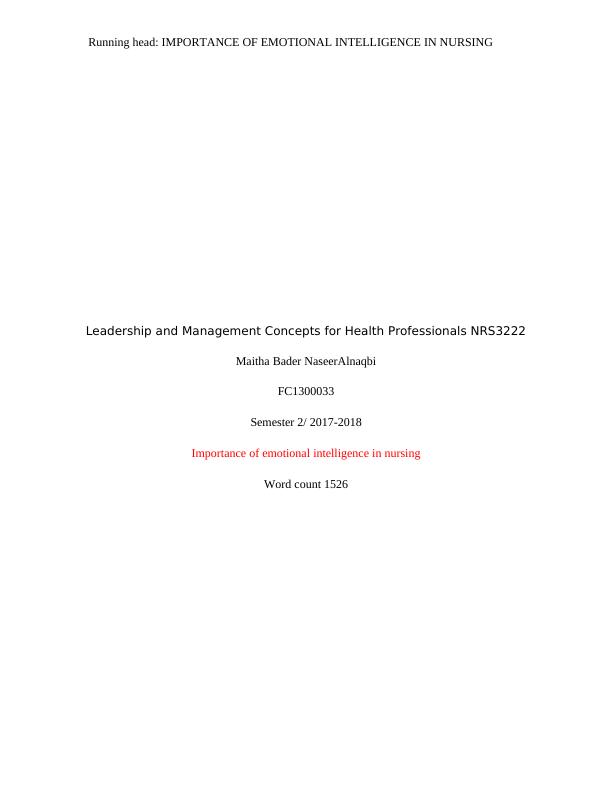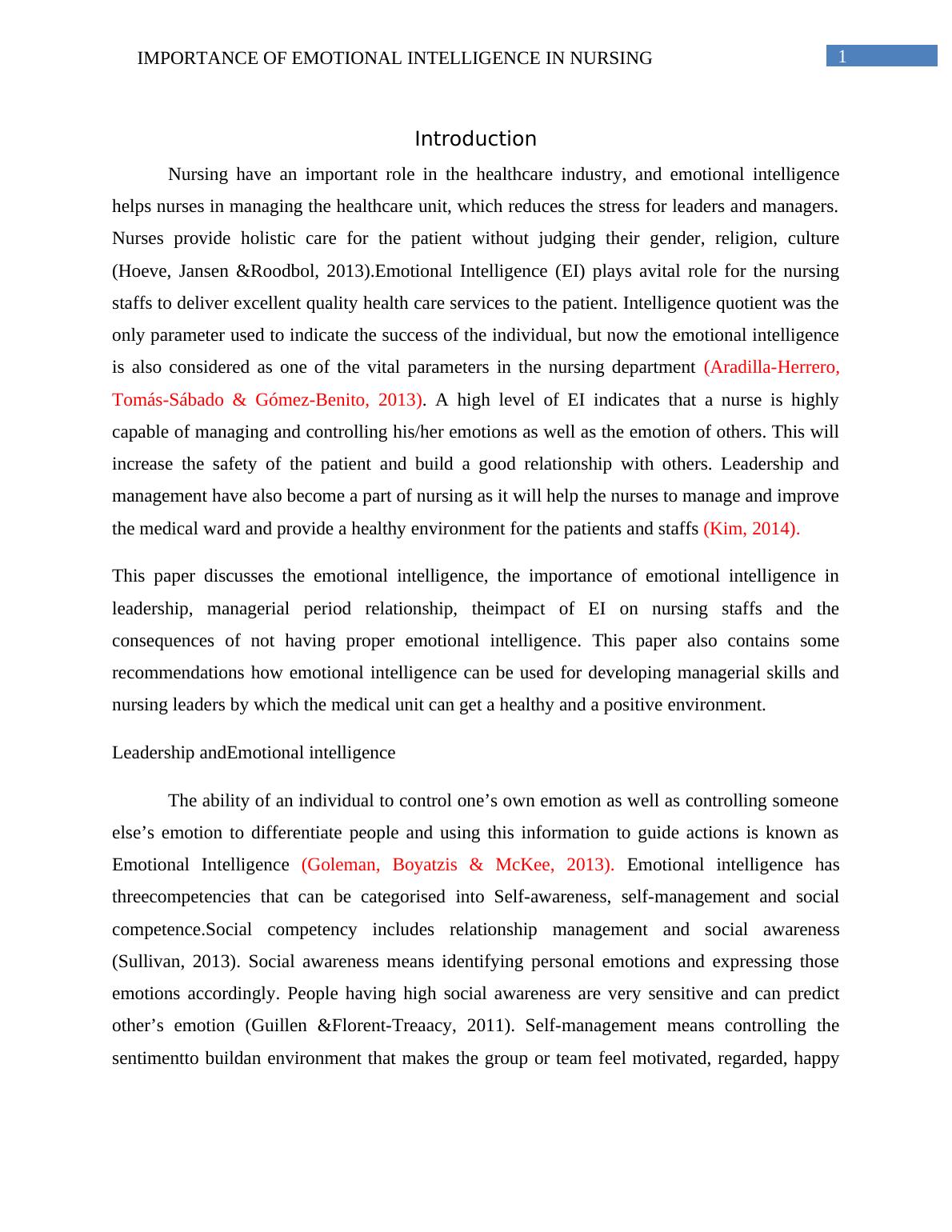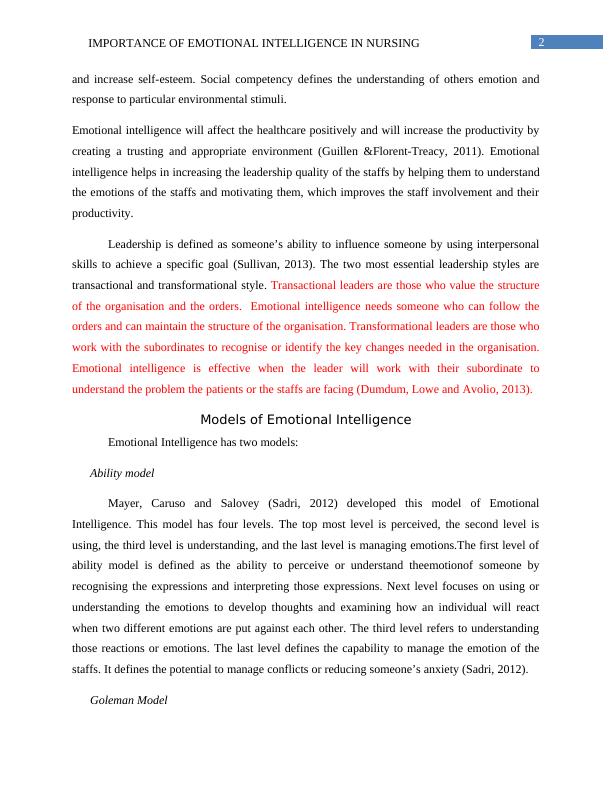The Importance of Emotional Intelligence in Nursing
Added on 2021-04-21
10 Pages2658 Words58 Views
Running head: IMPORTANCE OF EMOTIONAL INTELLIGENCE IN NURSINGLeadership and Management Concepts for Health Professionals NRS3222Maitha Bader NaseerAlnaqbiFC1300033Semester 2/ 2017-2018Importance of emotional intelligence in nursingWord count 1526

1IMPORTANCE OF EMOTIONAL INTELLIGENCE IN NURSINGIntroductionNursing have an important role in the healthcare industry, and emotional intelligencehelps nurses in managing the healthcare unit, which reduces the stress for leaders and managers.Nurses provide holistic care for the patient without judging their gender, religion, culture(Hoeve, Jansen &Roodbol, 2013).Emotional Intelligence (EI) plays avital role for the nursingstaffs to deliver excellent quality health care services to the patient. Intelligence quotient was theonly parameter used to indicate the success of the individual, but now the emotional intelligenceis also considered as one of the vital parameters in the nursing department (Aradilla-Herrero,Tomás-Sábado & Gómez-Benito, 2013). A high level of EI indicates that a nurse is highlycapable of managing and controlling his/her emotions as well as the emotion of others. This willincrease the safety of the patient and build a good relationship with others. Leadership andmanagement have also become a part of nursing as it will help the nurses to manage and improvethe medical ward and provide a healthy environment for the patients and staffs(Kim, 2014).This paper discusses the emotional intelligence, the importance of emotional intelligence inleadership, managerial period relationship, theimpact of EI on nursing staffs and theconsequences of not having proper emotional intelligence. This paper also contains somerecommendations how emotional intelligence can be used for developing managerial skills andnursing leaders by which the medical unit can get a healthy and a positive environment.Leadership andEmotional intelligenceThe ability of an individual to control one’s own emotion as well as controlling someoneelse’s emotion to differentiate people and using this information to guide actions is known asEmotional Intelligence (Goleman, Boyatzis & McKee, 2013). Emotional intelligence hasthreecompetencies that can be categorised into Self-awareness, self-management and socialcompetence.Social competency includes relationship management and social awareness(Sullivan, 2013). Social awareness means identifying personal emotions and expressing thoseemotions accordingly. People having high social awareness are very sensitive and can predictother’s emotion (Guillen &Florent-Treaacy, 2011). Self-management means controlling thesentimentto buildan environment that makes the group or team feel motivated, regarded, happy

2IMPORTANCE OF EMOTIONAL INTELLIGENCE IN NURSINGand increase self-esteem. Social competency defines the understanding of others emotion andresponse to particular environmental stimuli.Emotional intelligence will affect the healthcare positively and will increase the productivity bycreating a trusting and appropriate environment (Guillen &Florent-Treacy, 2011). Emotionalintelligence helps in increasing the leadership quality of the staffs by helping them to understandthe emotions of the staffs and motivating them, which improves the staff involvement and theirproductivity. Leadership is defined as someone’s ability to influence someone by using interpersonalskills to achieve a specific goal (Sullivan, 2013). The two most essential leadership styles aretransactional and transformational style. Transactional leaders are those who value the structureof the organisation and the orders. Emotional intelligence needs someone who can follow theorders and can maintain the structure of the organisation. Transformational leaders are those whowork with the subordinates to recognise or identify the key changes needed in the organisation.Emotional intelligence is effective when the leader will work with their subordinate tounderstand the problem the patients or the staffs are facing (Dumdum, Lowe and Avolio, 2013). Models of Emotional IntelligenceEmotional Intelligence has two models:Ability modelMayer, Caruso and Salovey (Sadri, 2012) developed this model of EmotionalIntelligence. This model has four levels. The top most level is perceived, the second level isusing, the third level is understanding, and the last level is managing emotions.The first level ofability model is defined as the ability to perceive or understand theemotionof someone byrecognising the expressions and interpreting those expressions. Next level focuses on using orunderstanding the emotions to develop thoughts and examining how an individual will reactwhen two different emotions are put against each other. The third level refers to understandingthose reactions or emotions. The last level defines the capability to manage the emotion of thestaffs. It defines the potential to manage conflicts or reducing someone’s anxiety (Sadri, 2012). Goleman Model

End of preview
Want to access all the pages? Upload your documents or become a member.
Related Documents
(Solution) Emotional Intelligence - Assignmentlg...
|11
|2750
|113
(PDF) Emotional intelligence and nursinglg...
|17
|850
|69
Leadership and Emotional Connection PDFlg...
|7
|2122
|159
Nursing Leadership: Emotional and Social Intelligencelg...
|10
|2717
|1
Emotional Intelligence In Nursing Leadershiplg...
|6
|977
|15
Emotional Intelligence and Its Importance in Healthcare Leadershiplg...
|4
|680
|177
